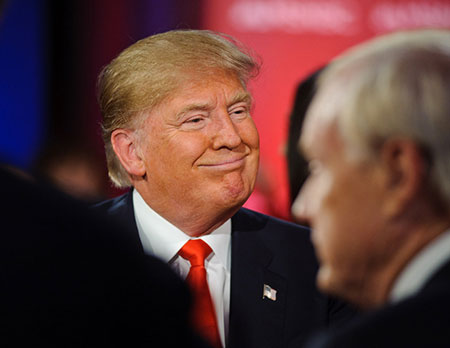Networks Track Trump's Pursuit of Historic Win

The smarter way to stay on top of broadcasting and cable industry. Sign up below
You are now subscribed
Your newsletter sign-up was successful
Donald Trump, the real estate developer and New York gadfly turned reality TV star and Pied Piper of disenfranchised voters, upended months of skepticism to power through Election Night and take a lead in the presidential race as it hurtled past midnight. The surprising contest, which was not decided as Tuesday turned to Wednesday, yielded hours of white-knuckle television drama.
Trump, who has never held public office or served in the military (though he did attend a military academy as a boy), has tapped into anger at a dysfunctional Washington and a wave of resentment blue collar workers who have seen jobs flee the country. His campaign had consistently defied the expectation that any major-party candidate would spend heavily on campaign ads and play ball with the mainstream media. Instead, Trump attacked the media even as it gave him so much earned media that he didn't have to spend anywhere near what a more conventional candiate would have.
Trump’s unexpected surge past Democratic stalwart Hillary Clinton sent futures markets lower because of the perception of how he would handle issues including trade and the budget as president. S&P 500 futures were down and stock markets in Australia and Japan dropped sharply. Gold and the dollar rose.
Related: Dispatches From the Clinton-Trump Front Lines
The stock market rose in trading Tuesday when most polls pointed to a Clinton victory.
When Britain surprisingly voted to exit the European market, media companies anticipated slowing ad spending in the U.K. Economic uncertainty in the U.S. could at least temporarily affect ad spending here as well.
Media outlets started the night talking about where the Republican party would go from here, given the phalanx of polls giving Clinton leads in key states and nationally. The answer the voters gave was: To the White House and in control of both the House and Senate.
The smarter way to stay on top of broadcasting and cable industry. Sign up below
CBS News anchor Scott Pelley set the stage at 8:15, saying any indication of a blowout was not in the cards. “This is a very close race,” he said.
Around 9 p.m. ET, CBS News Chief White House correspondent Major Garrett described the shift at Trump Tower from “definite despondency" to "cautious optimism." Moments later, contributor Bob Schieffer noted that Trump had yet to grab a state he was not expected to win, but that soon changed. The Trump camp’s cautious optimism became outright optimism as the underdog’s path to the presidency became that much clearer.
CBS News correspondent Nancy Cordes, set up at Clinton HQ, spoke of the growing despondency there.
Co-anchor Norah O’Donnell offered shocked viewers a range of metaphorical anecdotes as more and more key states fell Trump’s way—a call to one’s therapist, anti-anxiety meds, another bottle of wine.
Even Fox News, some of whose talent has served as a consistent conduit for Trump during the campaign, seemed taken aback by the outcome. Sporting a $30 million "Data Deck" set and new high-tech sheen, the leading cable news network struggled to make sense of the numbers as the night rolled on. Megyn Kelly asked fellow on-air talent, "Does anyone really know how Trump is going to govern?" Responded Chris Wallace, "Does Donald Trump know how he's going to govern?"
"It's not that complicated, if you really think about it," said Sean Hannity, phoning in as Trump has done frequently to shows like Fox & Friends. "People realize they have been lied to," citing education policy, Obamacare, foreign policy and other issues. Hannity said he had talked directly to Trump three times through the night, and said the candidate was "sober" but "hopeful."
The media shockwaves of a potential Trump victory were being contemplated across the television industry. Trump, for example, has said he would block an AT&T/Time Warner Cable deal and even maybe try to unwind Comcast/NBCU. He has threatened to sue news outlets and was branded a threat to the First Amendment by the Committee to Protect Journalists.
Poll after poll had predicted a Clinton win, even after some late-stage drama as FBI Director James Comey raised questions about the email accounts Clinton maintained during her tenure as Secretary of State. Websites like 538 and the New York Times' The Upshot had installed Clinton as a heavy favorite, with a roughly 90% chance of becoming the first female president. As the night wore on, those predictions were in tatters.
"We like to think that polling has become scientific," said historian Michael Beschloss, appearing on PBS. "That's going to be one of the ideas that gets thrown out after tonight."
Michael Malone, Jon Lafayette and John Eggerton contributed to this report.
